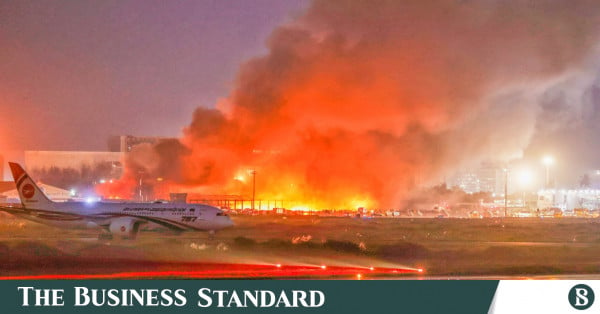Importers, freight forwarders, and clearing agents spent the weekend frantically calling each other, trying to find out what was left
TBS Report
20 October, 2025, 07:15 am
Last modified: 20 October, 2025, 07:41 am
Highlights:
Sudden strike at Chattogram Port halts container movement, drops handling 45%
Customs agents continue work stoppage; businesses threaten full port shutdown
Fires at Dhaka and Chattogram factories, then airport cargo hub
Airport fire lacked detection systems; negligence blamed on authorities
Losses from fires may exceed $1 billion, damaging Bangladesh’s trade image
Business leaders demand rollback of 41% port tariff hike within seven days
It has been a punishing few days for Bangladesh’s businesses – one shock after another, hammering the country’s already fragile trade chain.
The first blow came from Chattogram Port. On 15 October, the Prime Mover Owners Association called a sudden strike to protest the port authority’s abrupt hike of the heavy vehicle gate pass fee, a jump of nearly 300%, from Tk57 to Tk230. No prior consultation, no transition time. The strike brought container movements to a near standstill.
Keep updated, follow The Business Standard’s Google news channel
Though the association called off the strike yesterday after the Chittagong Port Authority (CPA) rolled back the additional fee, the damage was done – container handling dropped by 45% in just four days, leaving yards congested and exporters-importers fuming.
But if anyone thought the worst was over, they were mistaken. The customs agents have joined the chorus of protest. Their partial work abstention remains in force, and Bangladesh Customs Agents Association President Saiful Alam has said it will continue throughout the week.
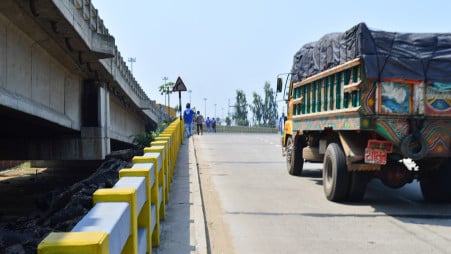
As if that was not enough, business leaders are now threatening to shut down port operations altogether if the CPA does not withdraw the average 41% tariff hike imposed from 15 October. The ultimatum is just seven days. The worry runs deep – Chattogram Port alone handled 90% of the country’s international trade worth around $120 billion in the 2024-25 fiscal year and nearly all its containers.
And while tensions simmered at the port, two devastating fires lit up another kind of crisis.
Just two days after the massive apparel factory and chemical warehouse fire in Dhaka’s Mirpur, killing 16 people, flames engulfed a major factory building inside the Chattogram EPZ – one of the country’s most compliant industrial zones.
Barely two days later, another inferno gutted the cargo village – a vital hub for exports and imports – at Dhaka’s Hazrat Shahjalal International Airport, reducing warehouses full of imported goods to ash.
“This incident has caused losses worth thousands of crores of taka for the country’s businesses and will inevitably lead to an image crisis in the international market,” said Mohammad Hatem, president of the Bangladesh Knitwear Manufacturers and Exporters Association (BKMEA), standing amid the charred wreckage at the airport.
Infograph: TBS
“>
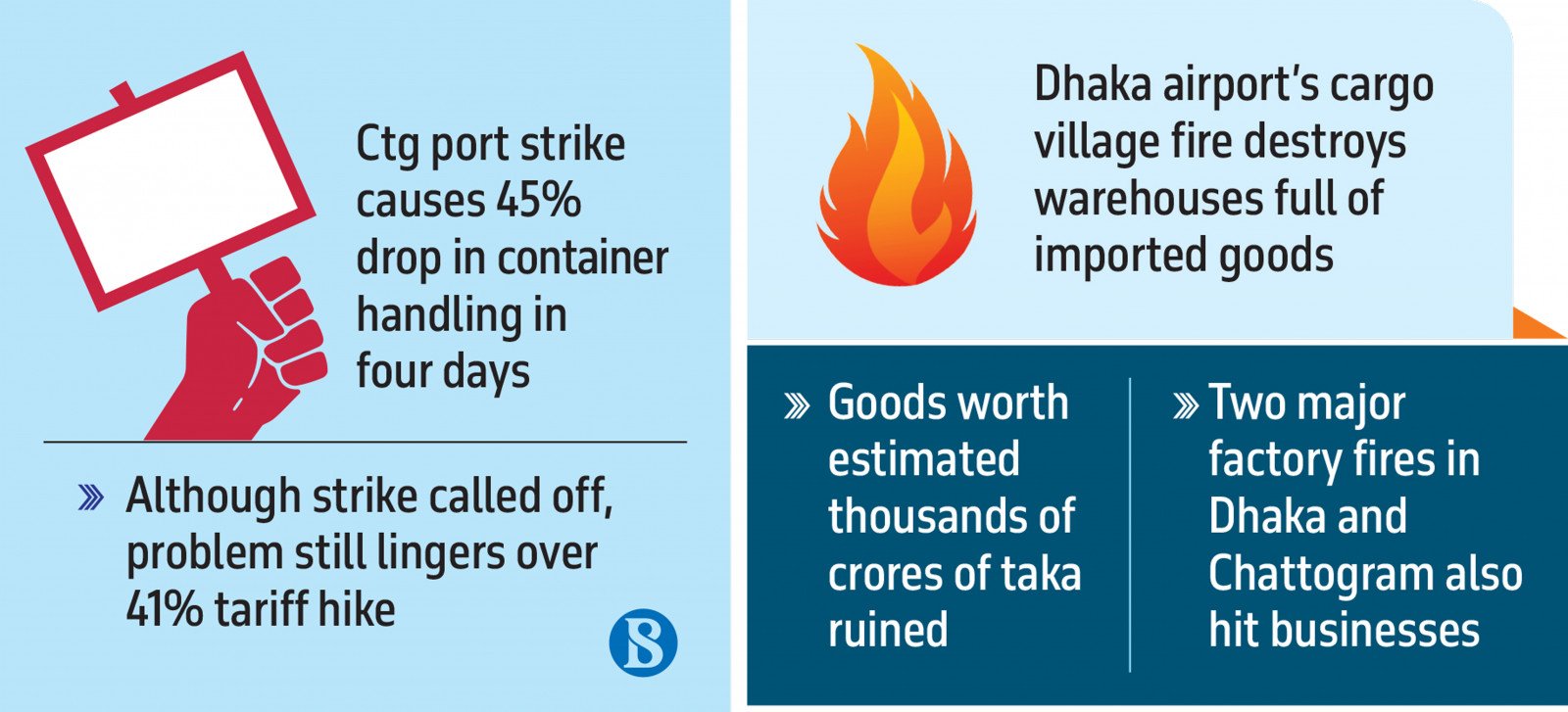
Infograph: TBS
Importers, freight forwarders, and clearing agents spent the weekend frantically calling each other, trying to find out what was left.
Alal Ahmed, a representative of C&F agent Ruhul International, said goods worth nearly $40,000 belonging to their firm were completely burnt. “The importing company keeps calling nonstop to ask what’s happening,” he told The Business Standard.
Mosharraf Hossain of SR International said they had nearly 10,000 kg of spare parts for Vivo mobile phones in the warehouse, along with goods from several other brands. “We’ve been told everything is gone,” he said, his voice heavy with disbelief. “Our loss will be around Tk100 crore.”
Rafiqul Islam, an official of Salvation Logistics Limited, said most mobile phone companies, including Xiaomi, Oppo, Realme, OnePlus, and Samsung, import their accessories through his firm. “A large volume of imported accessories was in that cargo, and we’ve learned all of it was burned,” he said. “The estimated loss is around Tk250 crore.”
According to Kazi Azmal Hossain, a leader of the C&F Agents Association, the scale of the loss is staggering. “About 4,000 bills of entry – import consignments – arrive daily through the Dhaka airport,” he said. “Small importers who depend on air shipments instead of sea containers will be hit hardest.”
Firefighters are pictured as smoke still rises a day after a massive fire at Dhaka airport on 19 October 2025. Photo: Rajib Dhar/TBS
“>
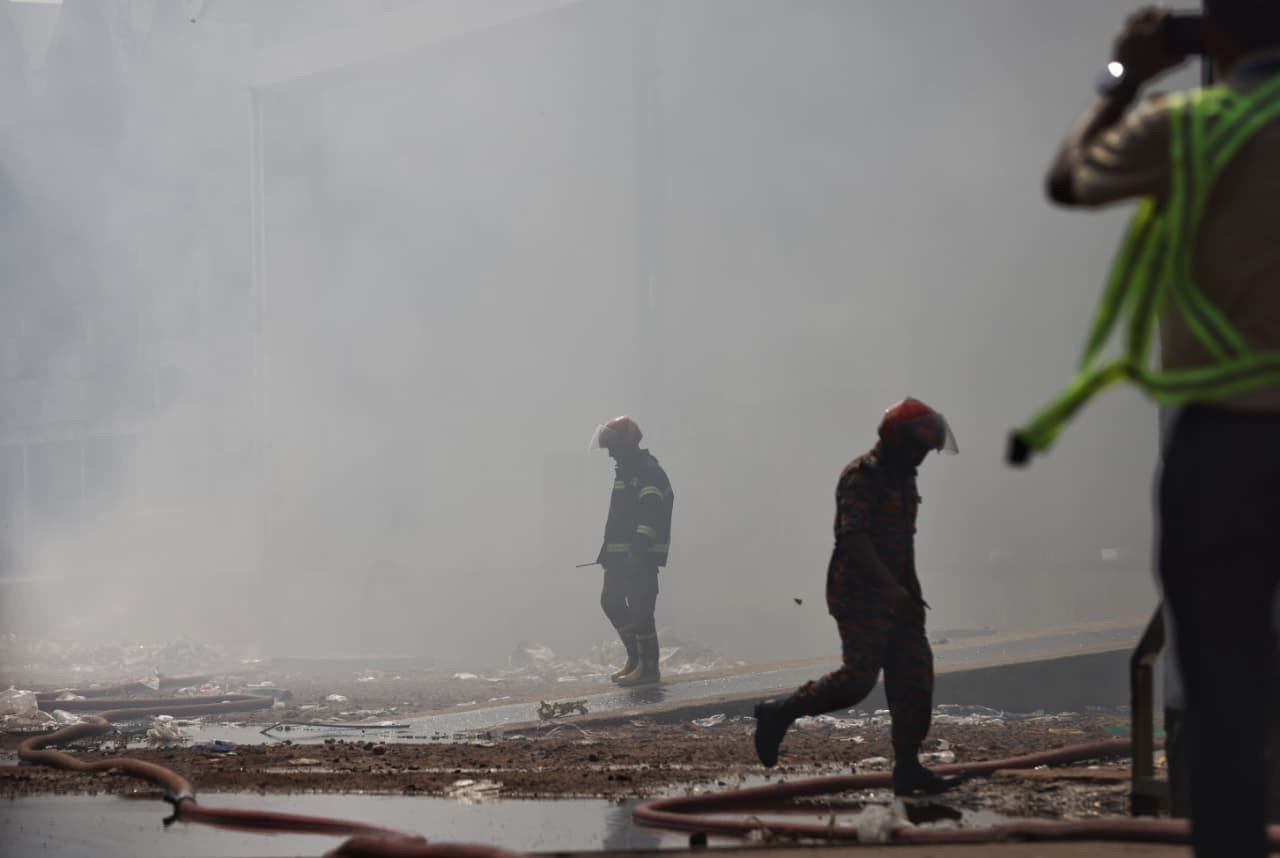
Firefighters are pictured as smoke still rises a day after a massive fire at Dhaka airport on 19 October 2025. Photo: Rajib Dhar/TBS
Negligence of airport authority?
The fire that broke out on Saturday at the cargo village was finally extinguished at 4:55pm yesterday, nearly 26 hours after it started.
As the smoke cleared, exporters, importers, and freight forwarders were left asking one question: why did the blaze spread so fast, and why did it take so long to bring it under control?
By yesterday evening, the Fire Service and Civil Defence provided the answer.
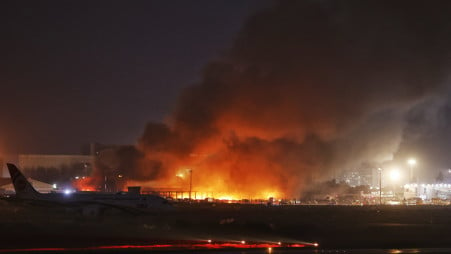
According to its officials, no proper fire detection or protection system was installed at the airport’s cargo village.
“The fire incident at the cargo village could have been prevented if proper detection and protection systems had been installed,” said Lt Col Mohammad Tajul Islam Chowdhury, director (operations and maintenance) of the Fire Service and Civil Defence.
“We did not find any such system at the site. That’s why a full investigation is needed to determine when and how the fire started,” he told reporters during a media briefing at the airport around 5pm yesterday.
Business leaders blamed negligence on the part of the Civil Aviation Authority.
“Of course, there was negligence,” said Mohammad Hatem, president of the BKMEA. “There should have been an independent fire extinguishing system. If Civil Aviation didn’t have that preparedness, the government must find out who is responsible for this failure.”
Meanwhile, Civil Aviation Adviser Sk Bashir Uddin told reporters yesterday that a thorough investigation will be conducted to determine the cause of the fire.
The incident came just six days after Bangladesh’s aviation security received high international recognition, dealing a major blow to the country’s image. The blaze gutted the airport’s cargo village and businesses now fear losses could reach up to $1 billion if foreign buyers cancel orders because of missing the deadline.
A fire struck Shahjalal International Airport, instantly incinerating the entire cargo village on 18 October 2025. Photo: Rajib Dhar
“>
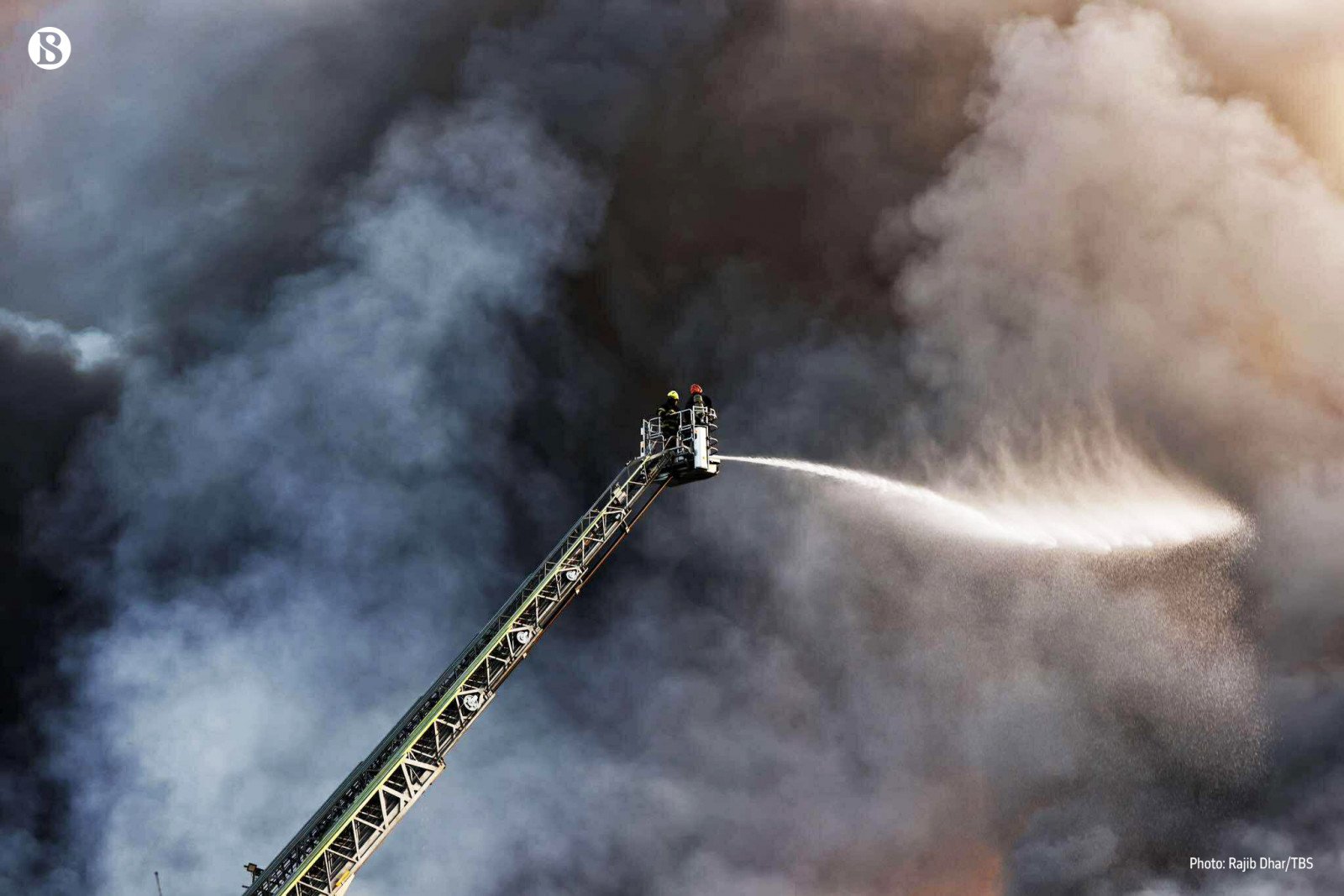
A fire struck Shahjalal International Airport, instantly incinerating the entire cargo village on 18 October 2025. Photo: Rajib Dhar
7-day ultimatum to withdraw 41% tariff hike at Ctg port
Business leaders in Chattogram have given the government a seven-day ultimatum to withdraw the average 41% tariff hike imposed by the port authority from 15 October, warning that they will shut down port operations if their demand is not met.
The announcement came at a protest rally organised by the Port Users’ Forum in Chattogram on Saturday, chaired by Amir Humayun Chowdhury, former president of the Chittagong Chamber of Commerce and Industry (CCCI).

Humayun said the business community had already submitted a memorandum to the chief adviser on 14 October, urging withdrawal of the increased charges.
“This tariff hike will not only hurt traders in Chattogram but will also affect businesses and consumers across the country,” he said. “This demand is not ours alone; it belongs to the entire nation.”
Announcing the next phase of protest, Humayun declared, “Starting tomorrow, customs agent employees will observe a symbolic four-hour work stoppage every day. We are giving the government one week to withdraw the increased tariffs. If our demand is not met within that time, we will shut down Chattogram Port.”
Trucks are parked amid a strike by transport operators who are protesting a sharp increase in vehicle entry fees at Chattogram Port on 19 October 2025. Photo: TBS
“>
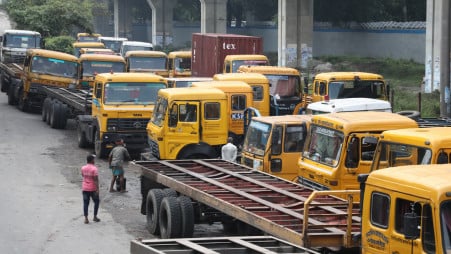
Trucks are parked amid a strike by transport operators who are protesting a sharp increase in vehicle entry fees at Chattogram Port on 19 October 2025. Photo: TBS
Businesses and economists are questioning the timing of the hike – coming when the economy is already faltering, businesses are under pressure, and exporters are struggling to stay competitive.
Port users allege that the new tariff structure is designed to benefit foreign operators at the port and its terminals.
For instance, tariffs tied to activities managed by private or foreign operators – crane operations, container loading and unloading, storage, reefer plug-ins, and container movements – have increased by an average of 144%. By contrast, CPA-managed charges such as pilotage, navigation, and river dues rose by about 70%.
Traders further argue that many of the port’s tariffs are set in US dollars, meaning that exchange rate depreciation has already inflated costs sharply.
In 2020, when the exchange rate was Tk85 per dollar, handling one TEU container at $43 cost Tk3,655. By 2024, with the dollar at Tk124, the same charge rose to Tk5,332, an increase of 45% purely due to the exchange rate.
“Tariffs were already climbing steeply because of currency changes – this new hike just adds more pain,” a port user said.
Chattogram Port connecting road & overpass bridge. Photo: Wikipedia
Chattogram Port connecting road & overpass bridge. Photo: Wikipedia

